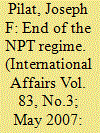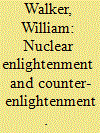|
|
|
Sort Order |
|
|
|
Items / Page
|
|
|
|
|
|
|
| Srl | Item |
| 1 |
ID:
077687


|
|
|
|
|
| Publication |
2007.
|
| Summary/Abstract |
William Walker's article, 'Nuclear enlightenment and counter-enlightenment', raises fundamental questions about the history of efforts to construct order in international politics in relation to nuclear arms and weapons-related capabilities. However, Walker's 'enlightenment' and 'counter-enlightenment' tropes are clumsy and unsatisfactory tools for analysing contemporary policies concerning nuclear deterrence, non-proliferation and disarmament. Walker holds that in the 1960s and 1970s most of the governments of the world came together in pursuit of 'a grand enlightenment project'. This thesis cannot withstand empirical scrutiny with regard to its three main themes-a supposed US-Soviet consensus on doctrines of stabilizing nuclear deterrence through mutual vulnerability, a notion that the NPT derived from 'concerted efforts to construct an international nuclear order meriting that title', and the view that the NPT embodied a commitment to achieve nuclear disarmament. Walker's criticisms of US nuclear policies since the late 1990s are in several cases overstated or ill-founded. Walker also exaggerates the potential influence of the United States over the policies of other countries. It is partly for this reason that the challenges at hand-both analytical and practical-are more complicated and dif cult than his article implies. His work nonetheless has the great merit of raising fundamental questions about international political order.
|
|
|
|
|
|
|
|
|
|
|
|
|
|
|
|
| 2 |
ID:
077680


|
|
|
|
|
| Publication |
2007.
|
| Summary/Abstract |
In the context of rising regional instability and conflict, along with increased incidents of global terrorism, in a dynamic, uncertain security environment, emerging nuclear and other weapons of mass destruction threats-both state proliferation and terrorism-are seen as growing dangers giving rise to increasing global insecurity. The international nuclear nonproliferation regime, the centerpiece of which is the Nuclear Non-proliferation Treaty (NPT), is essential to current and future non-proliferation efforts and needs to be maintained and strengthened, not replaced. The normative and legal weight of the regime is important for counterterrorism as well as non-proliferation, but it will not likely directly affect the behaviour of so-called 'rogue states' and terrorists. Preventing them from achieving their objectives if they attempt to wield nuclear and radiological weapons may deter and dissuade them, as may a credible prospect of punishment. The interaction of non-proliferation and deterrence, so clear during the Cold War history of the NPT, remain crucial parts of an increasingly complex picture
|
|
|
|
|
|
|
|
|
|
|
|
|
|
|
|
| 3 |
ID:
077683


|
|
|
|
|
| Publication |
2007.
|
| Summary/Abstract |
Applying the method of enlightenment correctly to the area of nuclear non-proliferation would require a major effort to critically evaluate ideologies. Liberal arms control-despite its many successes and merits-has devised over the years a whole set of ideological tenets and attitudes. Some of them have been transformed into beliefs that could be termed myths. The most prominent ideological myth of the liberal arms control school is the notion that the Nuclear Non-proliferation Treaty of 1968 (NPT) was in essence a disarmament agreement, not a non-proliferation treaty. To depict the negotiations as a premeditated effort of enlightenment, where the governments of this world came together to solemnly decide that some of them would be allowed to have some nuclear weapons for an interim period while the others would renounce their possession immediately, is pure. It would be equally wrong to qualify the 'grand bargain' as one between the nuclear haves and the nuclear have-nots. Another myth of the liberal arms control school is the notion that-in order to gain support for the NPT-the superpowers had altered their nuclear weapons strategy in the 1960s. Again, this contention is not borne out by the development of nuclear strategies and doctrines. The third myth is the contention that there was an abrupt shift in US non-proliferation policy as George W. Bush came into power. The major changes in US non-proliferation policy had already started during the Clinton administration and some of them can be traced back to the tenure of President George W. H. Bush senior. They all reflected the changed international environment and represented necessary adjustments of the non-proliferation strategy. The Clinton administration left some of the traditional paths of arms control and rightly undertook some changes that were necessary because traditional instruments of arms control were no longer adequate. The Bush administration continued that policy, but in a more radical way.
|
|
|
|
|
|
|
|
|
|
|
|
|
|
|
|
| 4 |
ID:
077684


|
|
|
|
|
| Publication |
2007.
|
| Summary/Abstract |
The debate on nuclear proliferation has become increasingly polarized. While there is widespread agreement on the perilous state of the traditional non-proliferation regime, the analyses of the causes differ widely. The liberal arms control community has sought to salvage the eroding non-proliferation regime both by overplaying its importance (nuclear enlightenment') as well as by blaming the policies of the nuclear weapons states, notably the United States. However, this view rests on several assumptions that have been increasingly revealed as myths: the myth of a universal non-proliferation norm generated largely by the Non-proliferation Treaty; the myth of a direct relationship between nuclear reductions and proliferation; and the myth of US policy being a cause of, rather than a reaction to, the non-proliferation crisis. Clinging to these myths is counterproductive, as it seeks to perpetuate old policies at the expense of new approaches. However, new approaches to non-proliferation are bound to gain in importance, even if they run counter to established arms control dogmas
|
|
|
|
|
|
|
|
|
|
|
|
|
|
|
|
| 5 |
ID:
077678


|
|
|
|
|
| Publication |
2007.
|
| Summary/Abstract |
Given the apocalyptic nature of nuclear weapons, how can states establish an international order that ensures survival while allowing the weapons to be used in controlled ways to discourage great wars, and while allowing nuclear technology to dif use for civil purposes? How can the possession of nuclear weapons by a few states be reconciled with their renunciation by the majority of states? Which political strategies can best deliver an international nuclear order that is effective, legitimate and durable? These have been central questions in the nuclear age. This article suggests that the effort to construct such an order displayed the characteristics of an enlightenment project, with its emphasis on balance and rationality, the quest for justice and trust among states, the feasibility of instrumental regulation, and the attachment to hope and progress. With the Nuclear Non-Proliferation Treaty at its heart, it necessarily gave precedence to diplomacy and containment over preventive war. The reasons why this conception of nuclear order was discarded by its erstwhile champion, the United States, in favour of one bearing traits of counter-enlightenment, are explored. Its alternative strategy can now be declared a failure. Avoidance of a greater disorder depends on recognition that the problem of nuclear order is more than the problem of proliferation, or of non-compliance, and on recovery-whatever the difficulties-of the cooperative yet pragmatic sensibility that lay behind the prior approach to order
|
|
|
|
|
|
|
|
|
|
|
|
|
|
|
|
| 6 |
ID:
077685


|
|
|
|
|
| Publication |
2007.
|
| Summary/Abstract |
Because most of the world's proliferators have used the Nuclear Non-proliferation Treaty's (NPT) call on nations to 'share the benefits of the applications of peaceful nuclear energy' to help justify their nuclear activities, it is unclear just how much any proliferator ultimately has been restrained by these rules. This needs to change but is unlikely, unless the NPT's qualifications on the right to 'peaceful' nuclear energy are read in a much more restrictive fashion to only authorize nuclear projects that are clearly beneficial economically and that truly can be safeguarded against diversion to make bombs. In this regard, our best hope is that, as nations consider how to prevent global warming, they might adopt clear economic guidelines that would compel all energy projects-both nuclear and non-nuclear-to compete economically against one another on a much more level playing field. This would make dangerous, uneconomical nuclear projects far less likely to be pursued, and a centering of the world's security on a proper reading of the NPT much more likely and sustainable. Indeed, unless economic discipline of this sort is attempted internationally, it is quite likely that the continued implementation of the current egregious view of the NPT will only serve to accelerate nuclear proliferation more rapidly than if there was no NPT at all.
|
|
|
|
|
|
|
|
|
|
|
|
|
|
|
|
| 7 |
ID:
077679


|
|
|
|
|
| Publication |
2007.
|
| Summary/Abstract |
William Walker is right to link the international nuclear order to the international political order, and to assert that the attempt to construct a rational nuclear international order around the Nuclear Non-proliferation Treaty is in a shambles. But he puts too much of the blame on the Bush administration (which he is right to criticize) and tends to neglect the fl awed character of the project itself (and the recent changes in the political international order which have an inevitable bearing on the nuclear one).
|
|
|
|
|
|
|
|
|
|
|
|
|
|
|
|
|
|
|
|
|